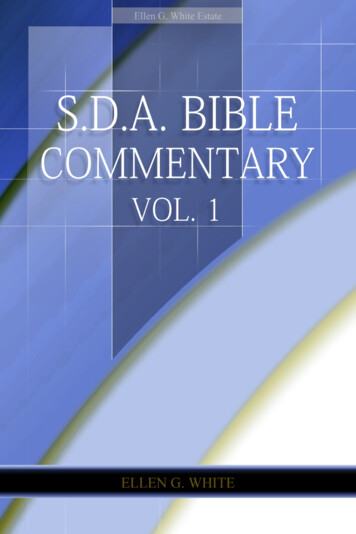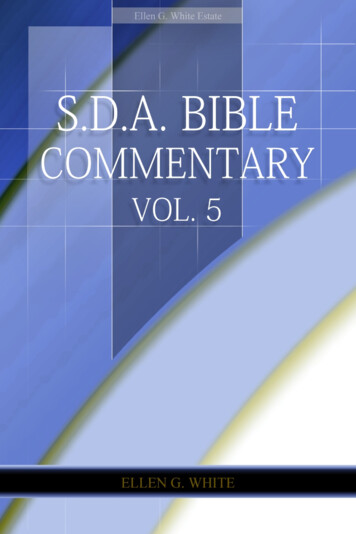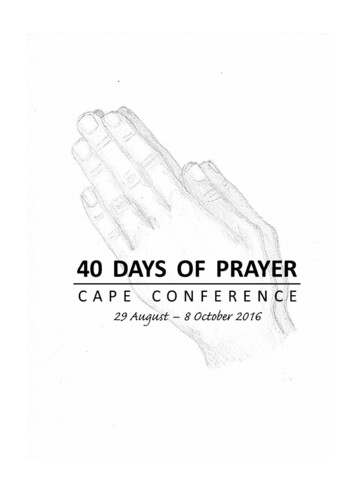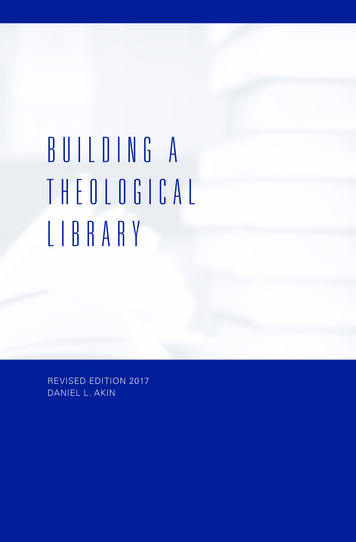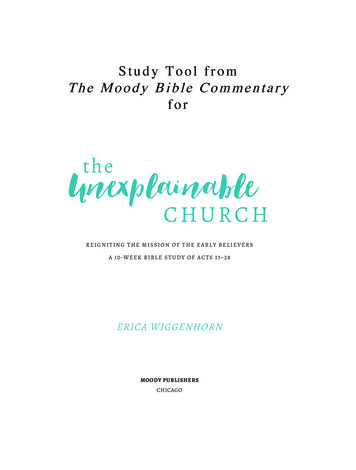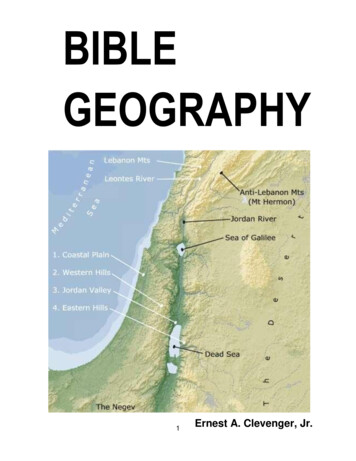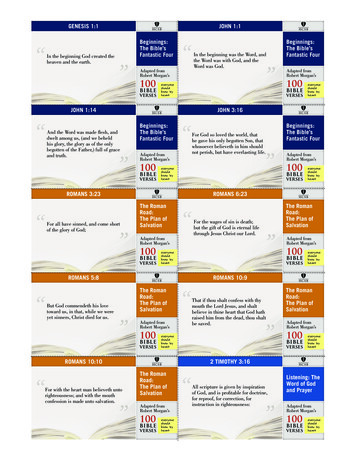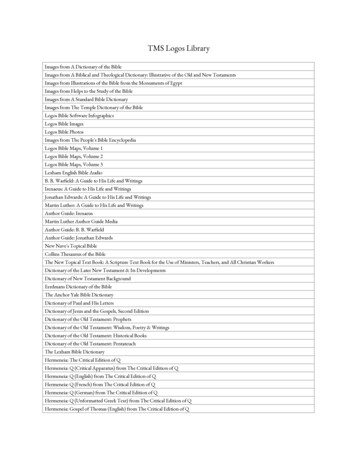
Transcription
S.D.A. BibleCommentary Vol. 4Ellen G. White1955Copyright 2017Ellen G. White Estate, Inc.
Information about this BookOverviewThis eBook is provided by the Ellen G. White Estate. It is includedin the larger free Online Books collection on the Ellen G. WhiteEstate Web site.About the AuthorEllen G. White (1827-1915) is considered the most widely translatedAmerican author, her works having been published in more than 160languages. She wrote more than 100,000 pages on a wide variety ofspiritual and practical topics. Guided by the Holy Spirit, she exaltedJesus and pointed to the Scriptures as the basis of one’s faith.Further LinksA Brief Biography of Ellen G. WhiteAbout the Ellen G. White EstateEnd User License AgreementThe viewing, printing or downloading of this book grants you onlya limited, nonexclusive and nontransferable license for use solelyby you for your own personal use. This license does not permitrepublication, distribution, assignment, sublicense, sale, preparationof derivative works, or other use. Any unauthorized use of this bookterminates the license granted hereby.Further InformationFor more information about the author, publishers, or how youcan support this service, please contact the Ellen G. White Estateat mail@whiteestate.org. We are thankful for your interest andfeedback and wish you God’s blessing as you read.i
ContentsInformation about this Book . . . . . . . . . . . . . . . . . . . . . . . . . . . . iIsaiah . . . . . . . . . . . . . . . . . . . . . . . . . . . . . . . . . . . . . . . . . . . . . . . . . 5Chapter 1 . . . . . . . . . . . . . . . . . . . . . . . . . . . . . . . . . . . . . . . . . . . . 6Chapter 3 . . . . . . . . . . . . . . . . . . . . . . . . . . . . . . . . . . . . . . . . . . . . 8Chapter 5 . . . . . . . . . . . . . . . . . . . . . . . . . . . . . . . . . . . . . . . . . . . . 9Chapter 6 . . . . . . . . . . . . . . . . . . . . . . . . . . . . . . . . . . . . . . . . . . . 11Chapter 8 . . . . . . . . . . . . . . . . . . . . . . . . . . . . . . . . . . . . . . . . . . . 17Chapter 14 . . . . . . . . . . . . . . . . . . . . . . . . . . . . . . . . . . . . . . . . . 20Chapter 25 . . . . . . . . . . . . . . . . . . . . . . . . . . . . . . . . . . . . . . . . . . 21Chapter 26 . . . . . . . . . . . . . . . . . . . . . . . . . . . . . . . . . . . . . . . . . 22Chapter 30 . . . . . . . . . . . . . . . . . . . . . . . . . . . . . . . . . . . . . . . . . 24Chapter 40 . . . . . . . . . . . . . . . . . . . . . . . . . . . . . . . . . . . . . . . . . 25Chapter 42 . . . . . . . . . . . . . . . . . . . . . . . . . . . . . . . . . . . . . . . . . 29Chapter 43 . . . . . . . . . . . . . . . . . . . . . . . . . . . . . . . . . . . . . . . . . . 31Chapter 48 . . . . . . . . . . . . . . . . . . . . . . . . . . . . . . . . . . . . . . . . . 32Chapter 49 . . . . . . . . . . . . . . . . . . . . . . . . . . . . . . . . . . . . . . . . . 33Chapter 50 . . . . . . . . . . . . . . . . . . . . . . . . . . . . . . . . . . . . . . . . . 34Chapter 53 . . . . . . . . . . . . . . . . . . . . . . . . . . . . . . . . . . . . . . . . . 36Chapter 54 . . . . . . . . . . . . . . . . . . . . . . . . . . . . . . . . . . . . . . . . . 38Chapter 57 . . . . . . . . . . . . . . . . . . . . . . . . . . . . . . . . . . . . . . . . . 39Chapter 58 . . . . . . . . . . . . . . . . . . . . . . . . . . . . . . . . . . . . . . . . . 40Chapter 59 . . . . . . . . . . . . . . . . . . . . . . . . . . . . . . . . . . . . . . . . . 48Chapter 60 . . . . . . . . . . . . . . . . . . . . . . . . . . . . . . . . . . . . . . . . . 49Chapter 61 . . . . . . . . . . . . . . . . . . . . . . . . . . . . . . . . . . . . . . . . . 50Chapter 64 . . . . . . . . . . . . . . . . . . . . . . . . . . . . . . . . . . . . . . . . . . 51Chapter 65 . . . . . . . . . . . . . . . . . . . . . . . . . . . . . . . . . . . . . . . . . 53Jeremiah . . . . . . . . . . . . . . . . . . . . . . . . . . . . . . . . . . . . . . . . . . . . . 55Chapter 3 . . . . . . . . . . . . . . . . . . . . . . . . . . . . . . . . . . . . . . . . . . 56Chapter 8 . . . . . . . . . . . . . . . . . . . . . . . . . . . . . . . . . . . . . . . . . . . 57Chapter 11 . . . . . . . . . . . . . . . . . . . . . . . . . . . . . . . . . . . . . . . . . 58Chapter 17 . . . . . . . . . . . . . . . . . . . . . . . . . . . . . . . . . . . . . . . . . 59Chapter 18 . . . . . . . . . . . . . . . . . . . . . . . . . . . . . . . . . . . . . . . . . . 61Chapter 20 . . . . . . . . . . . . . . . . . . . . . . . . . . . . . . . . . . . . . . . . . 62Chapter 23 . . . . . . . . . . . . . . . . . . . . . . . . . . . . . . . . . . . . . . . . . 64ii
ContentsiiiChapters 25; 27-29; 30, 31 . . . . . . . . . . . . . . . . . . . . . . . . . . . . 66Chapter 25 . . . . . . . . . . . . . . . . . . . . . . . . . . . . . . . . . . . . . . . . . . 67Chapter 27 . . . . . . . . . . . . . . . . . . . . . . . . . . . . . . . . . . . . . . . . . 69Chapter 28 . . . . . . . . . . . . . . . . . . . . . . . . . . . . . . . . . . . . . . . . . 70Chapter 29 . . . . . . . . . . . . . . . . . . . . . . . . . . . . . . . . . . . . . . . . . . 71Chapter 31 . . . . . . . . . . . . . . . . . . . . . . . . . . . . . . . . . . . . . . . . . 72Chapter 36 . . . . . . . . . . . . . . . . . . . . . . . . . . . . . . . . . . . . . . . . . 73Chapter 39 . . . . . . . . . . . . . . . . . . . . . . . . . . . . . . . . . . . . . . . . . 74Chapter 48 . . . . . . . . . . . . . . . . . . . . . . . . . . . . . . . . . . . . . . . . . 75Ezekiel . . . . . . . . . . . . . . . . . . . . . . . . . . . . . . . . . . . . . . . . . . . . . . 79Chapter 1 . . . . . . . . . . . . . . . . . . . . . . . . . . . . . . . . . . . . . . . . . . 80Chapter 9 . . . . . . . . . . . . . . . . . . . . . . . . . . . . . . . . . . . . . . . . . . 82Chapter 10 . . . . . . . . . . . . . . . . . . . . . . . . . . . . . . . . . . . . . . . . . 83Chapter 12 . . . . . . . . . . . . . . . . . . . . . . . . . . . . . . . . . . . . . . . . . 84Chapter 16 . . . . . . . . . . . . . . . . . . . . . . . . . . . . . . . . . . . . . . . . . 85Chapter 20 . . . . . . . . . . . . . . . . . . . . . . . . . . . . . . . . . . . . . . . . . 86Chapter 28 . . . . . . . . . . . . . . . . . . . . . . . . . . . . . . . . . . . . . . . . . . 87Chapter 31 . . . . . . . . . . . . . . . . . . . . . . . . . . . . . . . . . . . . . . . . . . 91Chapter 33 . . . . . . . . . . . . . . . . . . . . . . . . . . . . . . . . . . . . . . . . . 92Chapter 34 . . . . . . . . . . . . . . . . . . . . . . . . . . . . . . . . . . . . . . . . . 93Chapter 36 . . . . . . . . . . . . . . . . . . . . . . . . . . . . . . . . . . . . . . . . . 94Chapter 37 . . . . . . . . . . . . . . . . . . . . . . . . . . . . . . . . . . . . . . . . . 96Daniel . . . . . . . . . . . . . . . . . . . . . . . . . . . . . . . . . . . . . . . . . . . . . . . 99Chapter 1 . . . . . . . . . . . . . . . . . . . . . . . . . . . . . . . . . . . . . . . . . 100Chapter 2 . . . . . . . . . . . . . . . . . . . . . . . . . . . . . . . . . . . . . . . . . 104Chapter 3 . . . . . . . . . . . . . . . . . . . . . . . . . . . . . . . . . . . . . . . . . 107Chapter 4 . . . . . . . . . . . . . . . . . . . . . . . . . . . . . . . . . . . . . . . . . 109Chapter 5 . . . . . . . . . . . . . . . . . . . . . . . . . . . . . . . . . . . . . . . . . 111Chapter 6 . . . . . . . . . . . . . . . . . . . . . . . . . . . . . . . . . . . . . . . . . 112Chapter 7 . . . . . . . . . . . . . . . . . . . . . . . . . . . . . . . . . . . . . . . . . 113Chapter 9 . . . . . . . . . . . . . . . . . . . . . . . . . . . . . . . . . . . . . . . . . 115Chapter 10 . . . . . . . . . . . . . . . . . . . . . . . . . . . . . . . . . . . . . . . . 117Chapter 12 . . . . . . . . . . . . . . . . . . . . . . . . . . . . . . . . . . . . . . . . 119Hosea . . . . . . . . . . . . . . . . . . . . . . . . . . . . . . . . . . . . . . . . . . . . . . 121Chapter 4 . . . . . . . . . . . . . . . . . . . . . . . . . . . . . . . . . . . . . . . . . 122Chapter 6 . . . . . . . . . . . . . . . . . . . . . . . . . . . . . . . . . . . . . . . . . 123Chapter 8 . . . . . . . . . . . . . . . . . . . . . . . . . . . . . . . . . . . . . . . . . 124Chapter 12 . . . . . . . . . . . . . . . . . . . . . . . . . . . . . . . . . . . . . . . . 125
ivSDA Bible Commentary, vol. 4 (EGW)Chapter 13 . . . . . . . . . . . . . . . . . . . . . . . . . . . . . . . . . . . . . . . .Joel . . . . . . . . . . . . . . . . . . . . . . . . . . . . . . . . . . . . . . . . . . . . . . . .Chapter 2 . . . . . . . . . . . . . . . . . . . . . . . . . . . . . . . . . . . . . . . . .Haggai . . . . . . . . . . . . . . . . . . . . . . . . . . . . . . . . . . . . . . . . . . . . .Chapter 1 . . . . . . . . . . . . . . . . . . . . . . . . . . . . . . . . . . . . . . . . .Chapter 2 . . . . . . . . . . . . . . . . . . . . . . . . . . . . . . . . . . . . . . . . .Zechariah . . . . . . . . . . . . . . . . . . . . . . . . . . . . . . . . . . . . . . . . . . .Chapter 2 . . . . . . . . . . . . . . . . . . . . . . . . . . . . . . . . . . . . . . . . .Chapter 3 . . . . . . . . . . . . . . . . . . . . . . . . . . . . . . . . . . . . . . . . .Chapter 4 . . . . . . . . . . . . . . . . . . . . . . . . . . . . . . . . . . . . . . . . .Chapter 8 . . . . . . . . . . . . . . . . . . . . . . . . . . . . . . . . . . . . . . . . .Chapter 9 . . . . . . . . . . . . . . . . . . . . . . . . . . . . . . . . . . . . . . . . .Malachi . . . . . . . . . . . . . . . . . . . . . . . . . . . . . . . . . . . . . . . . . . . . .Chapter 1 . . . . . . . . . . . . . . . . . . . . . . . . . . . . . . . . . . . . . . . . .Chapter 2 . . . . . . . . . . . . . . . . . . . . . . . . . . . . . . . . . . . . . . . . .Chapter 3 . . . . . . . . . . . . . . . . . . . . . . . . . . . . . . . . . . . . . . . . .Chapter 4 . . . . . . . . . . . . . . . . . . . . . . . . . . . . . . . . . . . . . . . . 55
Isaiah
Chapter 11 (Hebrews 11:37). Isaiah Was Sawn Asunder—Isaiah, whowas permitted by the Lord to see wonderful things, was sawn asunder, because he faithfully reproved the sins of the Jewish nation. Theprophets who came to look after the Lord’s vineyard, were indeedbeaten and killed. “They were stoned, they were sawn asunder,were tempted, were slain with the sword; they wandered about insheepskins and goat-skins; being destitute, afflicted, tormented”—men of whom the world was not worthy. They were cruelly treated,and banished from the world (The Signs of the Times, February 17,1898).2, 3. A People Professedly Serving God—[Isaiah 1:2, 3quoted.] The course pursued by Israel toward God called forth thesewords. It was a proof of the people’s perversity that they manifestedless gratitude, less attachment, less acknowledgment of ownership,toward God than the animals of the field manifest toward their masters.The first chapter of Isaiah is a description of a people professedlyserving God, but walking in forbidden paths (Manuscript 29, 1911).4. Separation Led to Presumptuous, Foolhardy Madness—The professed people of God had separated from God, and had losttheir wisdom and perverted their understanding. They could not seeafar off; for they had forgotten that they had been purged from theirold sins. They moved restlessly and uncertainly under darkness,seeking to obliterate from their minds the memory of the freedom,assurance, and happiness of their former estate. They plunged intoall kinds of presumptuous, foolhardy madness, placed themselves inopposition to the providences of God, and deepened the guilt thatwas already upon them. They listened to the charges of Satan againstthe divine character, and represented God as devoid of mercy andforgiveness. The prophet writes of them, saying:“Ah sinful nation, a people laden with iniquity, a seed of evildoers, children that are corrupters: they have forsaken the Lord,6
Chapter 17they have provoked the Holy One of Israel unto anger, they are goneaway backward” (The Review and Herald, August 6, 1895).19. Obedience Leads to Perfection—We cannot overestimatethe value of simple faith and unquestioning obedience. It is byfollowing in the path of obedience in simple faith that the characterobtains perfection (Letter 119, 1895).
[1138]Chapter 318-23 (1 Peter 3:1-5). Beauty of Soul a Standing Rebuke—In the third chapter of Isaiah’s prophecy mention is made of theprevailing pride of the “daughters of Zion,” with “their tinklingornaments, . the chains, and the bracelets, and the mufflers, thebonnets, . and the headbands, and the tablets, and the earrings,the rings, and nose jewels, the changeable suits of apparel, and themantles, and the wimples, and the crisping pins, the glasses, andthe fine linen, and the hoods, and the vails.” Verses 18-23. Howdifferent this picture from that portrayed by the apostle Peter of theGod-fearing woman, who, estimating at its real value the “outwardadorning of plaiting the hair, and of wearing of gold, or of puttingon of apparel,” chooses rather to cultivate beauty of soul, “even theornament of a meek and quiet spirit, which is in the sight of Godof great price.” It was “after this manner in the old time” that “theholy women . who trusted in God, adorned themselves”; and their“chaste conversation coupled with fear” (1 Peter 3:1-5), as revealedin daily life, was ever a standing rebuke to their sisters who followedafter folly (The Review and Herald, March 4, 1915).8
Chapter 518-23 (Isaiah 8:12). Confidence in Man Blocks God’s Messages—[Isaiah 5:18 quoted.] Men may seek to strengthen theirforces by confederating together, making, as they suppose, strongsocieties to carry out the plans they have formed. They may liftup their souls in pride and self-sufficiency; but the One mighty incounsel does not plan with them. Their unbelief in His purposesand work, and their confidence in man, will not permit them to receive the messages He sends (The Review and Herald, December22, 1896).19-23 (Isaiah 50:11). Men Call Evil Good, and Good Evil—[Isaiah 5:19-23 quoted.] The class here represented, in order to exalttheir own opinions, employ a reasoning which is not authorized bythe Word of God. They walk in the sparks of their own kindling.By their specious reasoning, they confuse the distinction that Goddesires to have drawn between good and evil. The sacred is broughtdown on a level with common things. Avarice and selfishness arecalled by false names; they are called prudence. Their rising upin independence and rebellion, their revenge and stubbornness, intheir eyes are proofs of dignity, evidences of a noble mind. Theyact as though ignorance of divine things were not dangerous andeven fatal to the soul; and they prefer their own reasoning to divinerevelation, their own plans and human wisdom to the admonitionsand commands of God. The piety and conscientiousness of othersare called fanaticism, and those who practise truth and holiness arewatched and criticized. They deride those who teach and believethe mystery of godliness, “Christ in you, the hope of glory.” Theprinciples underlying these things are not discerned by them; andthey go on in wrong-doing, leaving the bars open for Satan to findready access to the soul (The Review and Herald, December 22,1896).20. Watch to Praise, Not Condemn—The lips that have utteredperverse things of God’s delegated servants and have scorned the9
10SDA Bible Commentary, vol. 4 (EGW)message they have borne, have put darkness for light, and light fordarkness. Instead of watching, as did the Pharisees, for somethingto condemn in the message or the messengers, something to scoff atand deride, had they opened their hearts to the bright beams of theSun of righteousness, they would have been offering grateful praiserather than watching for something which they could misinterpret ortwist so as to find fault (Letter 31a, 1894).Capable but Unconverted Men Do Great Harm—[Isaiah5:20 quoted.] Men may possess capabilities given them in trustof God, but if they are not humble men, daily converted men, asvessels of honor, they will do the greater harm because of their capabilities. If they are not learners of Christ Jesus, if they do not prayand keep their natural hereditary and cultivated tendencies undercontrol, traits of character that God abhors will pervert the judgmentof those who associate with them (Letter 31a, 1894).
Chapter 61-7 (Revelation 11:19). Isaiah’s Experience Represents LastDay Church—[Isaiah 6:1-4 quoted.] As the prophet Isaiah beheldthe glory of the Lord, he was amazed, and, overwhelmed with a [1139]sense of his own weakness and unworthiness, he cried, “Woe is me!for I am undone; because I am a man of unclean lips, and I dwell inthe midst of a people of unclean lips: for mine eyes have seen theKing, the Lord of Hosts.”Isaiah had denounced the sin of others; but now he sees himselfexposed to the same condemnation he had pronounced upon them.He had been satisfied with a cold, lifeless ceremony in his worshipof God. He had not known this until the vision was given him of theLord. How little now appeared his wisdom and talents as he lookedupon the sacredness and majesty of the sanctuary. How unworthyhe was! how unfitted for sacred service! His view of himself mightbe expressed in the language of the apostle Paul, “O wretched manthat I am! who shall deliver me from the body of this death?”But relief was sent to Isaiah in his distress. [Isaiah 6:6, 7 quoted.].The vision given to Isaiah represents the condition of God’speople in the last days. They are privileged to see by faith the workthat is going forward in the heavenly sanctuary. “And the templeof God was opened in heaven, and there was seen in his temple theark of his testament.” As they look by faith into the holy of holies,and see the work of Christ in the heavenly sanctuary, they perceivethat they are a people of unclean lips,—a people whose lips haveoften spoken vanity, and whose talents have not been sanctifiedand employed to the glory of God. Well may they despair as theycontrast their own weakness and unworthiness with the purity andloveliness of the glorious character of Christ. But if they, like Isaiah,will receive the impression the Lord designs shall be made uponthe heart, if they will humble their souls before God, there is hopefor them. The bow of promise is above the throne, and the work11
12SDA Bible Commentary, vol. 4 (EGW)done for Isaiah will be performed in them. God will respond to thepetitions coming from the contrite heart (The Review and Herald,December 22, 1896).Isaiah had a wonderful view of God’s glory. He saw the manifestation of God’s power, and after beholding His majesty, a messagecame to him to go and do a certain work. He felt wholly unworthyfor the work. What made him esteem himself unworthy? Did hethink himself unworthy before he had a view of God’s glory?—No;he imagined himself in a righteous state before God; but when theglory of the Lord of hosts was revealed to him, when he beheld theinexpressible majesty of God, he said, “I am undone; because I am aman of unclean lips, and I dwell in the midst of a people of uncleanlips; for mine eyes have seen the King, the Lord of hosts. Thenflew one of the seraphim unto me, having a living coal in his hands,which he had taken with the tongs from off the altar, and he laid itupon my mouth, and said, Lo, this hath touched thy lips; and thineiniquity is taken away, and thy sin purged.” This is the work that asindividuals we need to have done for us. We want the living coalfrom off the altar placed upon our lips. We want to hear the wordspoken, “Thine iniquity is taken away, and thy sin purged” (TheReview and Herald, June 4, 1889).1-8. Shekinah Glory Revealed to Isaiah—Christ Himself wasthe Lord of the temple. When He should leave it, its glory woulddepart—that glory once visible in the holy of holies over the mercyseat, where the high priest entered only once a year, on the great dayof atonement, with the blood of the slain victim (typical of the bloodof the Son of God shed for the sins of the world), and sprinkledit upon the altar. This was the Shekinah, the visible pavilion ofJehovah.It was this glory that was revealed to Isaiah, when he says, “Inthe year that king Uzziah died I saw also the Lord sitting upon athrone, high and lifted up, and his train filled the temple” [Isaiah6:1-8 quoted] (Manuscript 71, 1897).Vision of Glory Leads to Genuine Conviction of Unworthiness—In the year that King Uzziah died, Isaiah was permitted invision to look into the holy place, and into the holy of holies in theheavenly sanctuary. The curtains of the innermost sanctuary weredrawn aside, and a throne high and lifted up, towering as it were to
Chapter 613the very heavens, was revealed to his gaze. An indescribable gloryemanated from a personage on the throne, and His train filled thetemple, as His glory will finally fill the earth. Cherubim were on [1140]either side of the mercy-seat, as guards round the great king, andthey glowed with the glory that enshrouded them from the presenceof God. As their songs of praise resounded in deep, earnest notesof adoration, the pillars of the gate trembled, as if shaken by anearthquake. These holy beings sang forth the praise and glory ofGod with lips unpolluted with sin. The contrast between the feeblepraise which he had been accustomed to bestow upon the Creatorand the fervid praises of the seraphim, astonished and humiliatedthe prophet. He had for the time being the sublime privilege ofappreciating the spotless purity of Jehovah’s exalted character.While he listened to the song of the angels, as they cried, “Holy,holy, holy, is the Lord of hosts: the whole earth is full of his glory,”the glory, the infinite power, and the unsurpassed majesty of theLord passed before his vision, and was impressed upon his soul.In the light of this matchless radiance that made manifest all hecould bear in the revelation of the divine character, his own inwarddefilement stood out before him with startling clearness. His verywords seemed vile to him.Thus when the servant of God is permitted to behold the gloryof the God of heaven, as He is unveiled to humanity, and realizes toa slight degree the purity of the Holy One of Israel, he will makestartling confessions of the pollution of his soul, rather than proudboasts of his holiness. In deep humiliation Isaiah exclaimed, “Woeis me! for I am undone; because I am a man of unclean lips: . formine eyes have seen the king, the Lord of hosts.” This is not thatvoluntary humility and servile self-reproach that so many seem toconsider it a virtue to display. This vague mockery of humility isprompted by hearts full of pride and self-esteem. There are manywho demerit themselves in words, who would be disappointed if thiscourse did not call forth expressions of praise and appreciation fromothers. But the conviction of the prophet was genuine. As humanity,with its weakness and deformity, was brought out in contrast with theperfection of divine holiness and light and glory, he felt altogetherinefficient and unworthy. How could he go and speak to the peoplethe holy requirements of Jehovah, who was high and lifted up, and
14SDA Bible Commentary, vol. 4 (EGW)whose train filled the temple? While Isaiah was trembling andconscience-smitten, because of his impurity in the presence of thisunsurpassed glory, he said, “Then flew one of the seraphim unto me,having a live coal in his hand, which he had taken with the tongsfrom off the altar; and he laid it upon my mouth, and said, Lo, thishath touched thy lips; and thine iniquity is taken away, and thy sinpurged. Also I heard the voice of the Lord, saying, Whom shall Isend, and who will go for us? Then said I, Here am I; send me” (TheReview and Herald, October 16, 1888).2. Angels Fully Satisfied to Glorify God—The seraphim before the throne are so filled with reverential awe in beholding theglory of God that they do not for an instant look upon themselveswith self-complacency, or in admiration of themselves or one another. Their praise and glory are for the Lord of Hosts, who is highand lifted up, and the glory of whose train fills the temple. As theysee the future, when the whole earth shall be filled with His glory,the triumphant song of praise is echoed from one to another in melodious chant, “Holy, holy, holy, is the Lord of Hosts.” They are fullysatisfied to glorify God; and in His presence, beneath His smile ofapprobation, they wish for nothing more. In bearing His image, indoing His service and worshiping Him, their highest ambition isfully reached (The Review and Herald, December 22, 1896).5-7 (Matthew 12:34-36). Consider Words in Light ofHeaven—Let every soul who claims to be a son or a daughter ofGod examine himself in the light of heaven; let him consider thepolluted lips that make him “undone.” They are the medium of communication. [Matthew 12:34, 35 quoted.] Then let them not be usedin bringing from the treasure of the heart words that will dishonorGod and discourage those around you, but use them for the praiseand glory of God, who has formed them for this purpose. When thecleansing coal is applied from the glowing altar, the conscience willbe purged from dead works to serve the living God; and when the[1141] love of Jesus is the theme of contemplation, the words coming fromhuman lips will be full of praise and thanksgiving to God and to theLamb.How many words are spoken in lightness and foolishness, injesting and joking! This would not be so did the followers of Christrealize the truth of the words, “Every idle word that men shall speak,
Chapter 615they shall give account thereof in the day of judgment. For bythy words thou shalt be justified, and by thy words thou shalt becondemned.”Harsh and unkind words, words of censure and criticism of God’swork and His messengers, are indulged in by those who profess tobe His children. When these careless souls discern the greatness ofGod’s character, they will not mingle their spirit and attributes withHis service. When our eyes look by faith into the sanctuary, and takein the reality, the importance and holiness, of the work there beingdone, everything of a selfish nature will be abhorred by us. Sin willappear as it is,—the transgression of God’s holy law. The atonementwill be better understood; and by living, active faith, we shall seethat whatever of virtue humanity possesses, it exists only in JesusChrist, the world’s Redeemer (The Review and Herald, December22, 1896).5-8. When One Is Ready to Work With God, He CarriesMessage—Isaiah had a message from the God of heaven to give tothe backsliding people of Israel, and he gave them this message. Heknew what elements he had to deal with; he knew the stubbornnessand perversity of the heart, and how hard it would be to make anyimpression upon them. As he stood in the portico of the temple, theLord revealed Himself to him. The veil of the temple was withdrawn,the door lifted, and he had a view of the holy of holies within theveil. He saw the God of Israel before the throne high and lifted up,and the train of His glory filled the temple. As Isaiah senses his ownsinfulness, he cries out, “I am a man of unclean lips, and I dwell inthe midst of a people of unclean lips.” And there was seen the handthat took the live coal from off the altar, and touched his lips, andbade him be clean. Then he was ready to go with the message, andhe said, “Send me”; for he knew that the Spirit of God would bewith the message.To those who are engaged in the work of God, in the conversionof souls, it would seem as though it was impossible to reach theobdurate heart. This is how Isaiah felt, but when he saw that therewas a God above the cherubim, and that they were ready to workwith God, he was ready to carry the message (The Review andHerald, May 3, 1887).
16SDA Bible Commentary, vol. 4 (EGW)6. Live Coal Symbolizes Purity and Power—The live coal issymbolical of purification. If it touches the lips, no impure wordwill fall from them. The live coal also symbolizes the potencyof the efforts of the servants of the Lord. God hates all coldness,all commonness, all cheap efforts. Those who labor acceptably inHis cause, must be men who pray fervently, and whose works arewrought in God; and they will never have cause to be ashamed oftheir record. They will have an abundant entrance into the kingdomof our Lord Jesus Christ, and their reward will be given them,—eveneternal life (The Review and Herald, October 16, 1888).
Chapter 812 (see EGW comments on Isaiah 5:18-23). Satan Seeks toWiden Distance Between Heaven and Earth—The satanic agencies are constantly at work, sowing and watering the seeds of rebellion against the law of God, and Satan is gathering souls underhis black banner of revolt. He forms a confederacy with humanbeings to contend against purity and holiness. He has worked diligently, perseveringly, increasing the number who will confederatewith him. By his representations he seeks to widen the distancebetween heaven and earth, and he grows into the conviction that hecan wear out the patience of God, extinguish His love for man, andbring condemnation upon the whole human family (The Review andHerald, October 21, 1902).No Confederacy With Those Opposing the Truth—Let thewatchmen on the walls of Zion not join with those who are makingof none effect the truth as it is in Christ. Let them not join the confederacy of infidelity, popery, and Protestantism in exalting traditionabove Scripture, reason above revelation, and human talent abovethe divine influence and the vital power of godliness (The Review [1142]and Herald, March 24, 1896).The Divine Touch Needed—The gospel is now resolutely opposed on every hand. Never was the confederacy of evil greater thanat the present time. The spirits of darkness are combining with human agencies to set them firmly against the commandments of God.Traditions and falsehoods are exalted above the S
Information about this Book Overview This eBook is provided by theEllen G. White Estate. It is included in the larger freeOnline Bookscollection on the Ellen G. White Estate Web site. About the Author Ellen G. White (1827-1915) is considered the most widely translated American author, her works having been published in more than 160 languages.
